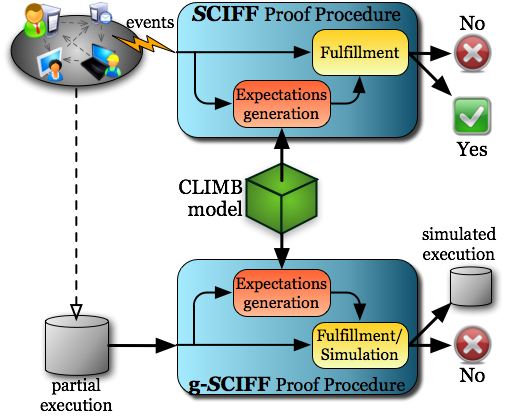SCIFF

The SCIFF Proof Procedure is a transition system which implements the operational proof-theoretic counterpart of SCIFF declarative semantics. It adopts a depth-first strategy and has been developed in SICSTUS Prolog and CHR. At a certain time:
- it firstly matches a specification w.r.t. the already happened events, generating a set of (positive and negative) expectations;
- it then verifies whether generated expectations are effectively fulfilled by the concrete execution, i.e., whether each positive (negative resp.) expectation has (does not have resp.) a corresponding happened event.
The latest version of SCIFF can be downloaded from
here. Each specification is
embedded into a so-called SCIFF project. For CLIMB, an example project is available.
To support run-time verification, the proof is able to run in two different modalities:
- open. Current pending expectations are suspended, waiting for further events. A
positive expectation is pending if it has not yet been fulfilled but it is still satisfiable,
whereas a negative expectation is pending if it is still possible to violate it. To run SCIFF
in open modality, type the query
:-run_openin SICSTUS. - closed. The proof makes the hypotheses that no further event can happen (i.e., that the
current execution is completed). As a consequence, it evaluates pending expectations: negative
pending expectations are fulfilled, whereas positive pending expectations are violated.
To run SCIFF in closed modality, type
:-runin SICSTUS.
g-SCIFF extends the proof procedure by modifying fulfillment of expectations: after having
analyzed the (partial) execution trace given as input (if any), it tries to complete it by considering
positive pending expectations and simulating corresponding happened events (which may trigger
new rules). g-SCIFF is invoked like SCIFF, but by previously activating fulfillment’s
extension (with the command :-set_option(fulfiller, on)).
As specified in the Static Verification section,
the CLIMB framework exploits g-SCIFF for detecting conflicts and discovering the presence of
dead activities. To this purpose, two queries are respectively supported in the CLIMB example project:
:-conflicts and :-deadActivities.
Please check instructions on the right to download, install and configure CLIMB projects inside SCIFF.